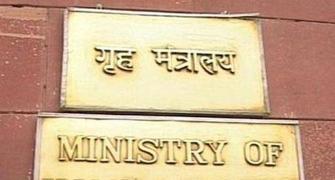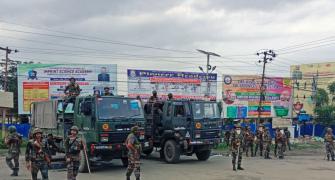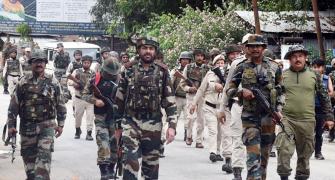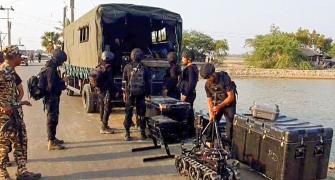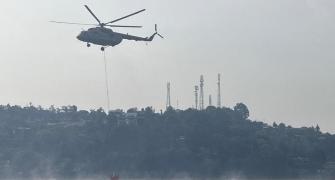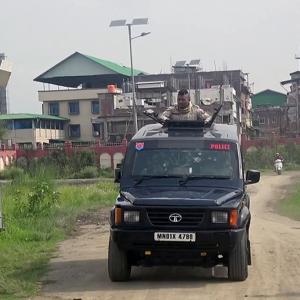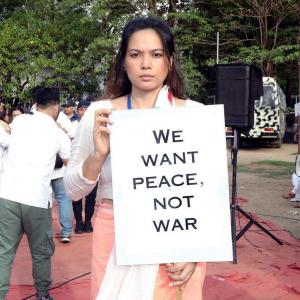Over seven months of violence severely hit businesses, schools, colleges and other institutions, besides disrupting transportation and communication networks. It also affected the agrarian sector, considered the mainstay of the state economy.

Manipur made headlines for much of 2023 as it witnessed one of the worst ethnic conflicts between the Kuki and Meitei communities, resulting in over 200 deaths and leaving nearly 60,000 people homeless.
Though violence broke out on May 3, tension had been building in the hill districts of Churachandpur and Kangpokpi since February due to the state government's efforts to remove encroachers from reserved forest areas.
In late February, the state government demolished few Kuki houses in Churachandpur district for encroaching on reserved forest land, triggering condemnation by Kuki-Zo community members.
Clashes broke out between demonstrators and police in Kangpokpi district in March when they tried to hold a rally against "encroachment of tribal land in the name of reserved forests, protected forests and wildlife sanctuary”.
Following the clashes, the state cabinet withdrew from the tripartite Suspension of Operations (SoO) talks with two Kuki-based outfits -- Kuki National Army and Zomi Revolutionary Army -- saying the "state government will not compromise on steps taken to protect forest resources and for eradicating poppy cultivation."
The SoO was in effect between the central, state government and Kuki militant outfits since 2008.
The decision caused further damage to the already strained relations between the Bharatiya Janata Party government and the Kukis.
Public unrest against Chief Minister N Biren Singh, particularly in Churachandpur district, eventually led to violent protests in April last week.
Newly formed Churachandpur district-based Indigenous Tribal Leaders Forum (ITLF) called an eight-hour shutdown on April 28 to protest eviction of villagers from forests.
As tension prevailed, a ‘Tribal Solidarity March' was organised on May 3 by the All Tribal Students Union Manipur (ATSUM) in the hill districts to oppose the demand for inclusion of Meitei community in the Scheduled Tribe category.
It was prompted after the Manipur high court passed an order instructing the state government to recommend to the Centre the inclusion of Meitei community in ST category.
The community accounts for 53 per cent population and dwells in the valley areas of the state, which comprises around nine per cent of its total territory.
Though the rally passed off peacefully in the Naga-dominated hill districts, in Churachandpur district headquarters town, where more than 15,000 protesters had gathered at a public ground, the situation took an ugly turn after a non-tribal driver was assaulted.
Later in the day, a 1,000-strong mob attacked the non-tribal villages of Torbung and Kangvai in Churachandpur and Bishnupur districts. Similar incidents of arson were reported from the border town of Moreh in Tengnoupal district the same night.
The state government immediately suspended mobile internet services "to maintain peace and communal harmony". Broadband services were also shut from May 5, as images of widespread violence led to communal tension.
Retaliatory attacks against Kuki localities and properties across Imphal valley were equally brutal.
Mobs targeted the 7th Manipur Rifles complex at Khabeisoi in Imphal East district and fled with hundreds of weapons, calling it a necessity "to defend their homes from invaders as security forces had failed to protect lives and properties of the people".
On May 3 night, Meiteis were targeted in Churachandpur and Moreh border town. Hundreds of houses were razed to the ground. Authorities clamped full curfew in all the nine affected districts hours later.
What followed were sporadic episodes of violence and arson, including a brutal assault on BJP MLA Vungzagin Valte and his driver by a mob at Nagamapal area in Imphal West district. While his driver succumbed to injuries in hospital, Valte, who was left for dead, survived and was later taken to Delhi for treatment.
Violence shifted from Imphal and Churachandpur to peripheral areas of Imphal valley as well, with both sides resorting to intense gunfights and ambushes.
Even as the state struggled to maintain law and order, Union Home Minister Amit Shah, accompanied by top central officials, arrived on May 29 for a four-day visit to help restore peace. Congress leader Rahul Gandhi also visited the state in the June last week.
In August first week, tension flared up again after ITLF announced its decision to bury the bodies of 35 Kuki Zo members. Reacting to the proposed burial, thousands from across Imphal valley started gathering, but were stopped by army personnel.
On December 3, satisfied with the improving law and order situation, the authorities restored mobile internet connectivity in most parts of the northeastern state.
Under pressure from the Supreme Court to dispose of unclaimed bodies, the government shifted 64 bodies lying at the morgues of JNIMS and RIMS in Imphal to Churachandpur and Kangpokpi districts for final rites in December third week.
A burial was arranged for 19 such bodies at Phaijang village in Kangpokpi district on December 15. On December 20, the bodies of 87 Kuki Zo victims of ethnic violence were laid to rest in Churachandpur district headquarters.
Over seven months of violence severely hit businesses, schools, colleges and other institutions, besides disrupting transportation and communication networks. It also affected the agrarian sector, considered the mainstay of the state economy.
Businessmen in Imphal valley said in the initial days of violence, the supply of a number of edible and non-edible items brought from outside the state sharply declined due to blockades called by Kuki-based organisations on both the national highways of the state. However, by July, movement of goods trucks became normal after central security forces began to provide security.
Farmers and traders in the hills, particularly in the Kuki-dominated areas, also could not come to Imphal valley for trade because of fear.
The thriving trade between the state and Myanmar through Moreh town also came to a halt after hundreds of Meiteis fled the border town and those from Imphal valley could not go to the neighbouring country for business.

